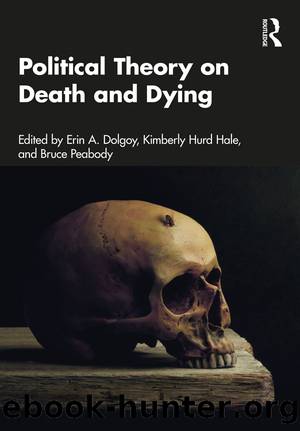Political Theory on Death and Dying by unknow

Author:unknow
Language: eng
Format: epub
ISBN: 9781000451757
Goodreads: 57632841
Publisher: Routledge
Published: 2021-09-14T00:00:00+00:00
Some Unanswered Questions
Spinoza, as noted in the opening, has been regarded as both an atheist and (posthumously) a pantheistic mysticâsomeone who saw divinity everywhere and regarded all things as being literally âin God.â The Ethics is replete with religious language and imagery, and it repeatedly suggests that those who know God, and who thus comprehend what is necessary and unchangeable, somehow join what is eternal. In his famous phrase, those understanding the permanent and inevitable do so âsub specie aeternitatis.â71
Perhaps nowhere is the cultivation of such thinking more apparent than in Spinozaâs teaching, at the end of Ethics V, that âsomething ofâ the mind âis eternalâ and endures after death. The arguments Spinoza employs to support this extraordinary (but nonetheless carefully worded) claim are complex, but they do not purport to demonstrateâthough they will leave many with the impressionâthat consciousness continues after the bodyâs demise.72 Indeed, as Spinoza writes a few propositions later, most people misunderstand the nature of the mindâs eternity because âthey confuse it with duration, and attribute to it the imagination, or memory, which they [falsely] believe remains after death.â73
So what, then, are we to make of Spinozaâs ultimate return to a reliance on superstitionâalbeit one that will admire and take its bearings from the insights of reasonâin giving the impression that he has proven the mindâs immortality? As previously mentioned, the possibility that some superstition will need to remain even in an advanced scientific society calls into question whether Spinoza believed human beings could be entirely liberated from the fear of death. But, we must also ask, has Spinoza himself been able to vindicate his own claims about the character of the summum bonum and the superiority of the philosophic life against religious alternatives? Consider the following: Spinoza may not believe (because he cannot demonstrate) that consciousness endures after death, but can he provide an adequate explanation of how consciousness arises in the first place? At the opening of Ethics V, Spinoza notes that René Descartes failed to explain the nature of the mind and its union with the body and so had ultimate recourse to God.74 But since Spinoza limits his own account only to the proximate causes of which we do have some knowledge, can he provide a satisfactory alternative explanation? In a notable scholium, Spinoza refuses to deny that âthe human body can be changed into another nature entirely different from its own.â He claims to have heard stories of a poet, who, after an illness, lost all memory of his former self. From this example, Spinoza concludes that death does not necessarily require a corpse, but he then hastily breaks off his analysis: ârather than provide the superstitious with material for raising new questions,â he says, âI prefer to leave this discussion unfinished.â75
The question the superstitious individual would ask Spinoza, of course, is not just how his scientific perspective could account for such an experienceâsurely modern neuroscience would have much to say about itâbut, more fundamentally, whether it could prove that this explanation has actually uncovered the phenomenonâs first cause.
Download
This site does not store any files on its server. We only index and link to content provided by other sites. Please contact the content providers to delete copyright contents if any and email us, we'll remove relevant links or contents immediately.
In Cold Blood by Truman Capote(3384)
The Innovators: How a Group of Hackers, Geniuses, and Geeks Created the Digital Revolution by Walter Isaacson(3209)
Steve Jobs by Walter Isaacson(2899)
All the President's Men by Carl Bernstein & Bob Woodward(2379)
Lonely Planet New York City by Lonely Planet(2227)
And the Band Played On by Randy Shilts(2209)
The Room Where It Happened by John Bolton;(2159)
The Poisoner's Handbook by Deborah Blum(2141)
The Innovators by Walter Isaacson(2105)
The Murder of Marilyn Monroe by Jay Margolis(2099)
Lincoln by David Herbert Donald(1989)
Being George Washington by Beck Glenn(1977)
A Colony in a Nation by Chris Hayes(1935)
Under the Banner of Heaven: A Story of Violent Faith by Jon Krakauer(1806)
Amelia Earhart by Doris L. Rich(1696)
The Unsettlers by Mark Sundeen(1690)
Dirt by Bill Buford(1682)
Birdmen by Lawrence Goldstone(1669)
Zeitoun by Dave Eggers(1653)
